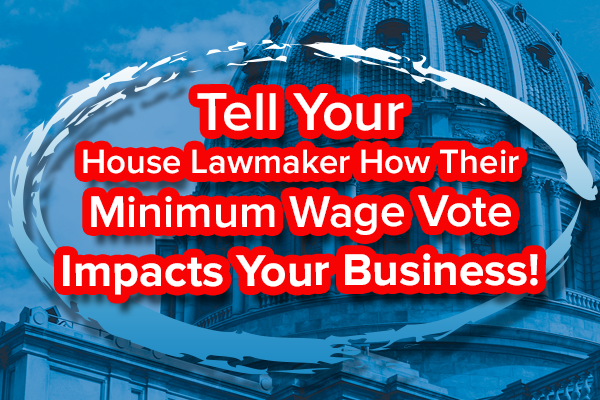It’s one of the busiest months of the year for state lawmakers as 2023-24 state budget negotiations heat up. As the PA Chamber works with elected officials leading up to the June 30 budget deadline and beyond, we’re focused on pro-growth victories that will boost Pennsylvania’s economic competitiveness and make our collective future bright!
Our goals – as shared with our local chamber partners during our 2023 Chamber Day event earlier this month – include tax reforms that will help Pennsylvania retain existing businesses, attract new ones, and create new jobs; permitting reforms that will help get critical projects permitted and built across the state; and workforce development policies that will help the Commonwealth boast a skilled and modern workforce that’s equipped to compete in the 21st century.
Tax Reforms
Accelerating the CNI Phase-Down
Act 53 of 2022 took a monumental step in advancing Pennsylvania’s competitive standing by beginning to reduce our extraordinarily high 9.99 percent Corporate Net Income Tax rate. It now stands at 8.99 percent and is scheduled to be reduced incrementally every January until it reaches 4.99 percent in 2031. But do we really want to wait almost a decade to realize the full benefits of the CNI reduction? The PA Chamber supports the call from Gov. Josh Shapiro and a bipartisan group of lawmakers to accelerate the CNI phasedown so we can keep pace with other states.
Once we get to 4.99 percent, Pennsylvania will have improved in our CNI tax rate to the nation’s 13th lowest (based on current rates) – a vast improvement over what was once a huge red flag for companies looking where to invest.
 Improving the Treatment of Net Operating Losses
Improving the Treatment of Net Operating Losses
A major tax improvement for small businesses, cyclical businesses, and startups would be reforming the way that Pennsylvania treats Net Operating Losses.
States and the federal government allow businesses to offset tax liability if they lost money in previous years, but Pennsylvania is one of only two states (and the other being New Hampshire) that caps NOL deductions below the federal limit. That makes us less competitive – particularly for start-ups that often lose money in their early years.
The PA Chamber is telling lawmakers that it’s time to end Pennsylvania’s penalty on start-up businesses.
Permitting Reform
A streamlined, timely, and affordable permitting process means more revenue for PA and more shovel-ready projects across our communities. It’s a win-win-win for the state’s employers, our workers, and our future as we look to lead the building of a more modernized infrastructure system. We thank Sen. Kristin Phillips-Hill for her leadership on legislation (which has already passed the Senate) that would achieve many of our top permitting reform priorities. Our priorities include:
- Third-party review: This would help with technical review and speed up the permitting process – and is already law in other states including Massachusetts, Washington, and New Jersey.
- Codify the Governor’s One-Stop-Shop: Governor Shapiro has already taken steps to streamline the state’s permitting system. Codifying his new office for permitting approval will provide long-term durability to this approach.
- Streamlined Permit Appeals: Limit the scope of permit challenges to only issues raised during public comment.
- Stop Draining Agency Resources: Let agencies including the Department of Environmental Protection do their jobs instead of having their time (and money) drained on resources like defending themselves in permit appeals.
- “Deemed Approved”: Timely permit decisions are everything in the project approval process – we recommend a set timeframe for applications to be decided or otherwise “deemed approved.”
Workforce Development Policies
The PA Chamber is proud to support a multi-tiered workforce development policy that considers the ways our workforce is changing, the challenges employers are facing, and the avenues that today’s students and job seekers want to take to become the next generation of skilled leaders.
That includes finding new ways to bridge the current job skills gap by coordinating with educators and employers, expanding the workforce pool through the expansion of the successful Clean Slate law, addressing childcare challenges by encouraging employer flexibility, and getting an early start in fostering a new generation of skilled talent by implementing a K-12 curriculum that aligns with workforce needs.
You can read more about our broad workforce development policy here.

As we work to advance a pro-growth agenda through the legislature, we’re cautioning lawmakers against legislation that would have a detrimental impact on the Commonwealth’s employers, particularly small businesses. In mid-June, the state House passed a $15 minimum wage bill that would increase labor costs by up to 300 percent for some businesses, with the direst consequences being on rural and small businesses. A recent Independent Fiscal Office study found that a $15 minimum wage would lead to the loss of 30,000 jobs and reduced hours. Click here to see how your House lawmaker voted, and either thank them (for voting no) or (if they voted yes) tell them to think about the harmful impact this legislation would have on their local business community. We urge the state Senate to oppose this bill.